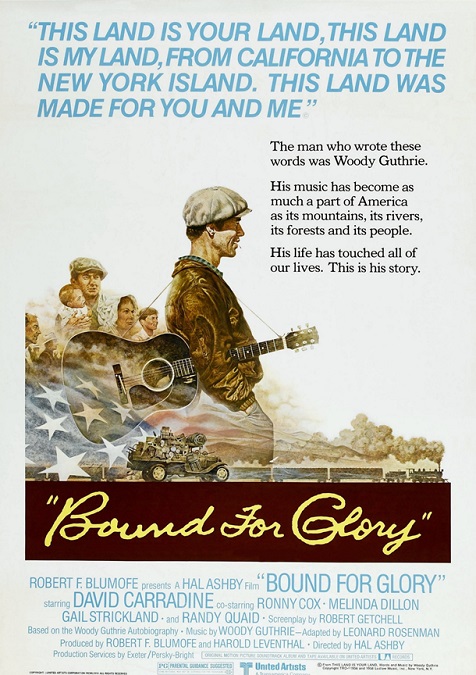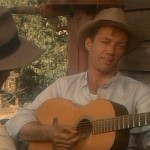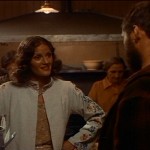
Bound For Glory – 1976
David Carradine stars as Woody Guthrie, the famous American folk singer in this biopic film that chronicles the beginnings of his career as a musician. The movie was good enough, I suppose, except that I have never been a fan of Guthrie’s music, nor have I ever been a fan of politics and activism. However, I will still call Bound for Glory a good movie. I enjoyed it because of its beautiful cinematography, and its competent acting.
The film was based on the auto-biography of the same name, written by Guthrie. However, certain small things were omitted. For example, the movie leaves out 2 of his 3 wives, and 6 of his 8 children. But I’ll give it credit for leaving the extra-marital affairs in. But it’s alright. The key points are all there, and I think a lot of that happened after the film’s stopping point.
Guthrie was a sign painter living in the dust bowl era, otherwise known as the Dirty Thirties. He had a certain amount of wanderlust that drove him to leave his wife, Mary, played by Melinda Dillon, taking with him his paint brushes and a guitar. He became a vagabond and a boxcar hobo, making his way from Texas to California, constantly looking for work in exchange for food. Along the way, he becomes a part of the poor migrant culture, and is affected by the terrible conditions caused by extreme poverty.
He uses his music to speak out against the social injustice and inequality. Eventually, he is noticed by a man in a position to get him a job as a radio singer. He becomes popular and gains money and status. He uses his newfound wealth to bring Mary and his children to California.
But here is where I felt the real drama of the movie showed its face. The sponsors of his radio program wanted him to stop singing about the horrible conditions of the working class migrants. Mary urges him to give in to the corporate sponsors so that he can keep his job. His friend, singing partner, and fellow activist, Ozark Bule, played by Ronny Cox, also begged him to follow the rules.
But the plight of the working class affected Woody too much and he refused to do as he was told. But then Mary, seeing that the money would soon be gone, left him. And she was right. He gets fired from his job. Finally, in order to stay true to his principles, he goes back out on the road so that he can sing to and support the poor workers to bring them hope. He says he is headed for New York, and of course, that is the point where Guthrie’s career really takes off. But it is also where the movie ends. The last shot is the image of Guthrie sitting alone on top of a train boxcar, playing his guitar as he rides off into the sunset.
One of the best things about the movie was its wonderful cinematography. The realistic depiction of the dry and dusty town of Pampa, Texas was appropriately depressing and colorless. The dust storm was particularly impressive. In fact, Best Cinematography was one of the two Academy Awards the movie won, the other being Best Music, Original Song Score.
Carradine did a good enough job, as did Dillon and Cox. I have no complaints about the acting. I think if the movie had any real failings it was the pacing. It was just way too slow. The trick is that I believe that the problem was inherent in the era in which the story took place. It was the middle of the Great Depression. It was a time of unemployment, frustration, and emotional depression. Such a story doesn’t easily lend itself to a quick, energetic pace. Unfortunately, it sometimes came across as just dull, especially for someone like me who is not interested in twangy folk music or social activism.
And another thing. Guthrie was portrayed as a hero of the working class, the common man. But he was a terrible husband and an irresponsible father. I suppose it all depends on one’s personal philosophies. Is it alright to abandon your family if you are serving a greater social good? As far as I’m concerned, no, it is not. If a man chooses to have a family, his first responsibility should be to them if he has any say in the matter.
And as a last thought, I have to mention two other actors with smaller parts that I thought actually did very well, creating memorable characters. First was a fellow migrant worker with a wife and child, Luther Johnson, played by a very young Randy Quaid. The other is Pauline, a very wealthy woman who Woody has an affair with, played by Gail Strickland. They both played their parts well and deserve to be recognized.








